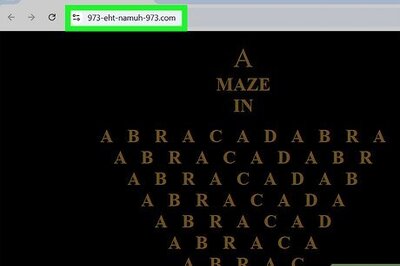
views
New Delhi: The Bharatiya Janata Party (BJP) Tuesday gave notice for a breach of privilege motion against Prime Minister Manmohan Singh in connection with the 2008 bribe-for-votes scam. The opposition party said the prime minister misled the house by his remarks that the panel which probed the bribe-for-votes scam in 2008 had found insufficient evidence to draw any conclusions.
What does this mean for the PM?
Prime Minister Manmohan Singh faces no real threat this time in Parliament. The privilege notices moved by the Opposition under rule 193 of Lok Sabha and rule 176 of the Rajya Sabha entail a short discussion without voting. We take a look at what the Constitution says about privilege motions, rule 193, rule 176 and the procedures governing them.
What is Parliamentary privilege?
Parliamentary privilege or absolute privilege is the legal immunity enjoyed by members of certain legislatures, in which legislators are granted protection against civil or criminal liability for actions done or statements made related to one's duties as a legislature. A Parliamentary privilege allows members to discharge their functions without external interferences. When any of these rights are attacked by any individual or authority, the offence is called a breach of privilege. A breach of privilege is an act in violation of the privilege or either House of Parliament, such as by false swearing before a committee.
A privileged motion is granted precedence over ordinary business because it concerns matters of great importance or urgency. Such motions are not debatable, although in case of questions of privilege, the chair may feel the need to elicit relevant facts from members.
How is a privilege motion moved in Lok Sabha?
Under rule 222 of the Lok Sabha, a member may, with the consent of the Speaker, raise a question involving a breach of privilege either of a member or of the House or of a Committee. Under rule 223 of the Lok Sabha, a member wishing to raise a question of privilege shall give notice in writing to the Secretary-General by 10:00 am on the day the question is proposed to be raised. If the question raised is based on a document, the notice shall be accompanied by the document.
Admissibility of questions of privilege
Under rule 224, the right to raise a question of privilege shall be governed by the following conditions:
Not more than one question shall be raised at the same sitting;
The question shall be restricted to a specific matter of recent occurrence; and
The matter requires the intervention of the House.
Mode of raising questions of privilege
Under rule 225, the Speaker, if he gives consent under rule 222 and holds that the matter proposed to be discussed is in order, shall call the member concerned, who shall rise in his place and, while asking for leave to raise the question of privilege, make a short statement relevant to:
Provided that where the Speaker has refused his consent under rule 222 or is of opinion that the matter proposed to be discussed is not in order, he may, if he thinks it necessary, read the notice of question of privilege and state that he refuses consent or holds that the notice of question of privilege is not in order:
Provided further that the Speaker may, if he is satisfied about the urgency of the matter, allow a question of privilege to be raised at any time during the course of a sitting after the disposal of questions.
The House may consider the question and come to a decision or refer it to a Committee of Privileges on a motion made either by the member who has raised the question of privilege or by any other member.
How is a privilege motion moved in Rajya Sabha?
Under rule 188, a member wishing to raise a question of privilege shall give notice in writing to the Secretary-General, before the commencement of the sitting on the day the question is proposed to be raised. If the question proposed to be raised is based on a document, the notice shall be accompanied by the document. Under rule 189, the right to raise a question of privilege shall be governed by the following conditions:
The question shall be restricted to a specific matter of recent occurrence; and the matter requires the intervention of the Council.
Mode of raising a question of privilege
The Chairman, if he gives consent under rule 187 and holds that the matter proposed to be discussed is in order, shall, after the questions and before the list of business is entered upon, call the member concerned, who shall rise in his place and while asking for leave to raise the question of privilege make a short statement.
If he is satisfied about the urgency of the matter, allow a question of privilege to be raised at any time during the course of a sitting after the disposal of questions.
Reference to Committee of Privileges
The Council may consider the question and come to a decision or refer it to the Committee of Privileges on a motion made either by the member who has raised the question of privilege or by any other member. The Chairman may issue such directions as he may consider necessary for regulating the procedure in connection with all matters connected with the consideration of the question of privilege either in the Committee or in the Council.
Short duration discussions
Under rule 176, any member desirous of raising discussion on a matter of urgent public importance may give notice in writing to the Secretary-General specifying clearly and precisely the matter to be raised:
Provided that the notice shall be accompanied by an explanatory note stating reasons for raising discussion on the matter in question and provided further that the notice shall be supported by the signatures of at least two other members.
Chairman to decide admissibility
If the Chairman is satisfied, after calling for such information from the member who has given notice and from the Minister as he may consider necessary, that the matter is urgent and is of sufficient public importance to be raised in the Council at an early date, he may admit the notice and in consultation with the Leader of the Council fix the date on which such matter may be taken up for discussion and allow such time for discussion, not exceeding two and a half hours, as he may consider appropriate in the circumstances:
Provided that if an early opportunity is otherwise available for the discussion of the matter, the Chairman may refuse to admit the notice.
No formal motion
There shall be no formal motion before the Council nor voting. The member who has given notice may make a short statement and the Minister shall reply shortly. Any member who has previously intimated to the Chairman may be permitted to take part in the discussion.
Short duration discussions under Rule 193
Notices of Motions under Rule 184 and Short Duration Discussions under Rule 193 regarding statements to be made in the House by Ministers or statements, reports or papers to be laid on the Table shall be accepted from 10:00 am on the day the list of business wherein the item has been included, is circulated to members.
Any member desirous of raising discussion on a matter of urgent public importance may give notice in writing to the Secretary-General specifying clearly and precisely the matter to be raised:
Provided that the notice shall be accompanied by an explanatory note stating reasons for raising discussion on the matter in question: Provided further that the notice shall be supported by the signatures of at least two other members.
The notices of Short Duration Discussions not conforming to the above provisions in the Rules of Procedure are liable to be held out of order.




















Comments
0 comment